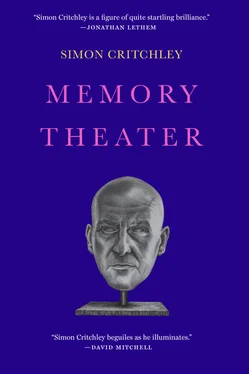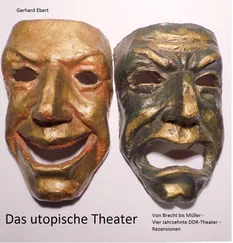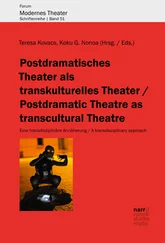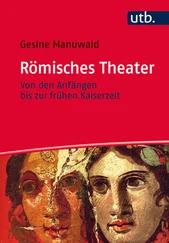Row seven was devoted to languages. French and German grammar did not present insuperable difficulties, but it was extremely hard to symbolize the complex grid pattern of Attic Greek verb forms in all three voices (active, passive, and middle). By the time I had listed the relative pronouns and adjectival forms, I had almost run out of statues. I daubed the last statue with random fragments from Sophocles: ἄνθρωπος ἔστι πνευˆμα ϰαι σϰιά μόνoν and ἀλλ᾽ οὐδἐν ἔρπει ψευˆδος ε’ις γηˆρας χρόνου. But it didn’t really matter, as I was quite delusional by this time.
By early in 2010, work on the statues had finished and the theater was complete. I installed the statues in the theater and waited quietly for the day of my death to come: June 13. Lucky for some. Utterly unkempt, I had no friends and kept to myself. Aside from my duties in the theater, I spent the days in long bike rides through the dunes and developed the habit of visiting a local Trappist abbey where they brewed very strong beer (Blond, Dubel, Tripel, Quadrupel; 1, 2, 3, 4—I would periodically change the number sequence by which I imbibed. 1432 was a favorite. I don’t know why). I would get drunk in the afternoon and then cycle home. It guaranteed a couple of hours’ sleep. To the outside eye I was a lunatic. People wouldn’t return my gaze (the Dutch like to keep to themselves). But within I felt completely calm.
I’d asked Bert to design small wooden drawers to be placed under the statues, into which I put files, papers, records, photographs, and often copies of books. Although the contents of the drawers were invisible to the viewing eye and had been reduced to symbols and notation on the statues, I took solace in knowing that the objects were present. Latent content beneath the manifest. The theater is my unconscious. Fuck off.
Like crazy Crusoe in his island cave out of his mind for fear of cannibals, I would sit onstage and inspect my artificial kingdom, my realm, my shrunken reál . I sat there for hours running through the loci and rehearsing the meanings of the various statues until I recalled everything lucidly. Time had become space. History was geography. Everything was a map and I’d mapped everything. I’d built a vast, living, personal encyclopedia, or living intelligence system, where, through mnemotechnics, I would be given a conspectus of the whole. This was the way I would finally overcome my amnesia. Total recall. Lights out.
My time of death was 3:51 in the afternoon. Every day for months prior to my demise, I would enter the theater and begin the process of remembering. I would sit onstage with a torch and a stock of spare Duracell batteries and begin to recollect, to inwardize the outward, er-innern . Sometimes I would begin at row seven, sometimes with row one, sometimes entirely randomly. I would shine the torch at a statue, then close my eyes and try to make manifest its meaning. I read medieval texts on the craft of memory like The Guidonian Hand and Hugh of St. Victor’s little book on building Noah’s ark, De arca Noe mystica . The ark was within, not without. I prepared for the deluge.
My first attempts at recollection were poor. I kept forgetting and would have to look into the drawers for reminders. It sometimes took four or five hours to complete the whole sequence. It was exhausting. I began to panic. The clock was ticking. I developed a weird rash on my chest and the palms of my hands.
After a month or so of sustained effort, my technique improved and I could recall the entirety of the theater in two hours. This was the plan: to enter the theater at around 1:40 p.m. on June 13, make myself comfortable, check my torch, and begin the process. At the instant of my death, I would have recalled the totality of my knowledge. At the moment of termination, I would become God-like, transfigured, radiant, perfectly self-sufficient, alpha and omega.
The day of my deathfinally arrived. The hallucinations had continued pretty much unabated since I’d left New York, but became more auditory than visual. They were my only company, the only voices I heard apart from my own. As I sat up in bed at night, they would speak to me, reassure me, embolden me in a low-pitched female voice. Like a public address system in a German airport. I didn’t sleep at all the night of June 12. I took the bike out in the moonlight and looked at the dunes, the only feature in an otherwise completely flat landscape. Immanence. This commercial war and water machine of a country.
In the morning, I bathed very carefully, cleaning my feet and ears. I shaved off my grizzled beard and carefully flossed my teeth. Then I clipped my nails and tidied up the cuticles. Cuticles. I love that word. Hunger had long left me. I felt as if my body was light and bird-like, as if I were full of air, like a medieval female Flemish mystic. Hadewych of Antwerp or Christina the Astonishing or that other one who dived into an oven and spent three days under the water in an icy river. What was she called? She lived near here. I dressed in my one remaining suit. Mortuary clothes. I seemed to need the weight of the clothes in order to prevent myself from levitating. I felt amazing, like the moment in the dream inside the cathedral all those years back. Garment of grace.
1:51 p.m. I began the process of recollection in reverse. Row seven: French, German, and Greek grammar. My lips moved without effort or sound in a perfect automatism. I was like that puppet in Kleist’s essay: perfection is possible only in a marionette or a god. I was somehow both. 2:30 p.m. Row five. I worked backwards through the history of philosophy. My recall was flawless: Hegel, Fichte, Schiller, Goethe, Bentham, Condorcet, Wollstonecraft. Next statue. Next statue. Next statue. Boethius, Augustine, Gregory of Nyssa, Antony, Origen, Paul. Next statue. Backwards through the Pre-Socratics to Thales. Row two. On time. I moved through the sequence of my works. I seemed to see an arc, an idea of order for the first time, a series of lines of argument converging on a present that ascended into a kind of eternity. The philosophy of disappointment melted away into a vast and radiant immanence, like St. Anthony at the end of Flaubert’s book: be matter . I was matter. Matter was divine. I was God (or Spinoza). 3:26 p.m. Row one. The easiest and fastest. I gave myself the leisure to linger over certain memories and roll the words in my mouth. The first time I held my son after the emergency caesarian (where was he now? What did he do?). Touching my father’s bony hand as he left for the hospice. The constant look of terror in my mother’s eyes. Her hermaphrodite lover. My hand in the machine. Jilted John on the radio. Blood on the floor. Recall complete. Knowledge absolute.
3:50 p.m. The fire inside me now. My lips stopped moving. I waited. Full of Vicodin, I waited for the pain to sear through my head. I was ready. My face was relaxed. My arms hung limply at my sides. The beating of my heart suddenly became irregular. It was as if I heard that woman’s voice in the theater saying, “So, here it is at last, the distinguished and noble thing.” My eyes were open, surveying my empire and recalling everything. I felt an extraordinary lightness, a kind of beatitude that had nothing to do with happiness. An elation. An ecstasy perhaps. A feeling of absolute sovereignty. The relief at forgoing the counterfeit eternity of existence. Mortality. Now, I thought. Now.
I waited. Nothing happened. Soon it was 4:00 p.m. The afternoon shower that had beaten against the roof of the theater subsided into the light tapping of drizzle and then nothing. I heard birds singing in the woods. Wood doves. Brusque return to the world. I was not dead. I began to cry. It had all seemed so perfect.
Читать дальше












